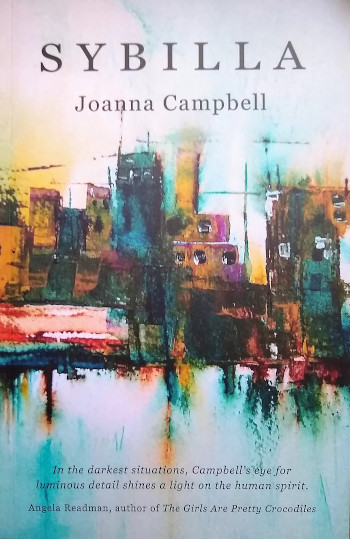
The winning entry of National Flash Fiction Day’s inaugural novella-in-flash competition is a vivid splash of light striated with human emotions.
Joanna Campbell’s ‘Sybilla’ draws us into the seemingly peaceful world of a Berlin bookshop where shelves are stacked with books rescued from bombed homes. Campbell’s lyrical writing paints exquisite watercolours of each scene. In the first flash, aka chapter, ‘Stacking’, we get to know the routine of Lara and Felix, from the “blue cup and saucer” Lara keeps by the cash register, which Felix refills from “a steaming jug every hour”, to the rows they construct “of jacketless little books about trees and butterflies and canals” and the pile they build of books about “ships, viaducts and mountains.”
Adding to that the sounds of “coffee pouring and the hands of the grandfather clock juddering” and my first impression was that there’s nowhere else I’d rather spend time.
But outside in their city of ruined buildings, a wall is rising that divides West from East Berlin: “The Wall grows fast, casting the shop into shadow.”
Each of their regular customers is affected in a different way – the man separated from his wife’s nursing home, “Barbara, manageress of the bakery on the corner” (…) “now parted from her daughter, who is about to give birth.” Only the crows don’t mind the new obstruction.
Yet it is the unspoken shadows that create the greatest rifts: unrequited love, jealousy and undiagnosed post-traumatic stress disorder among them.
Campbell uses nature to explore these themes as well as mark the passage of time, as rain falls, trees shed their leaves, flower, fruit, and birds use the Wall as their vantage point. It’s a glorious way to add texture to pages that manage to always to retain an overriding beauty that’s a pleasure to read despite the darkness lurking, sometimes in plain view, and other times emanating from unsuspected sources. Part of this richness comes from a delight in everyday objects from an old candlestand to the apparent purity of long friendship. When we meet Max, “his suit is drenched, his hat dripping,” and he says to the coat folded over his arm: “‘Why on earth didn’t I put you on?’”
It’s an introduction that paints an immediately likeable portrait, but there are complications here too. Max is the father of the Sybilla of the title, who is trapped on the far side of the Wall with her mother. The comfort he and Lara find in each other is tempered by the presence of this woman and child, out of sight but haunting each encounter as Lara’s feelings deepen.
There’s humour too in many of the anecdotes and descriptions, as in Felix’s memory of his childhood house being bombed: “Opened up like a tin.”
As they raked through the wreckage and chose what to salvage, the act seeded in Felix a need to rescue and conserve: “Their grandfather clock emerged, his father bent double beneath it like an ant bearing the weight of a privet leaf.”
And just in case we’ve forgotten the horrors they’re mired in: “For a moment Felix thought his father was trying to be comical, staggering to the left, to the right, skirting around the dead.”
This blend of levity and gravity makes Campell’s story far more substantial than its slimness belies. Hope, grief, love and betrayal dance around each other in this tale of individuals stitched to a particular place and time. Enchanting, enlightening and poignant.
Sybilla by Joanna Campbell is published by and available to buy from the National Flash Fiction Day Bookshop.
This book was given to me in exchange for a fair review.
What are you reading? I’d love to know. I’m always happy to receive reviews of books, art, theatre and film. To submit or suggest a book review, please send an email to judydarley (at) iCloud.com.
